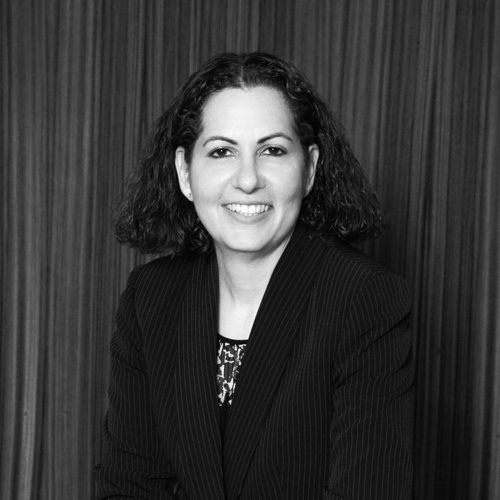Beverly Rubin never envisioned having a legal career growing up, let alone the unorthodox leadership role she assumes to this day at an international marketing agency. As a child, her only exposure to the legal profession was through a second cousin who happened to be a lawyer. She didn’t give it much thought—that is, until after college. Rubin had studied literature and history at the University of Virginia and was working as a dental assistant when the idea of law school sprung to mind.
Rubin describes her decision to attend law school as mechanical rather than emotional during the economic uncertainties of the early 1980s. “I liked the concept of law, that it was just logic,” Rubin explains. “I knew I liked reading and problem-solving, so it seemed like the legal profession might suit me.” With her two-year-old child in tow, she committed to three years of study at law school and soon reveled in her education.
Unlike many of her peers, Rubin says, she thoroughly enjoyed law school; poring over texts and exercising critical thinking to piece together judgements. While the information was all new to her, she connected with the intensive research component instilled during her undergraduate studies. After graduation, she took a one-year clerkship at the North Carolina Court of Appeals. That’s where she worked for James Wynn, who former President Barack Obama later appointed to the Fourth Circuit Court of Appeals. The pair still keep in touch yet, in turn, Rubin nowadays more often embraces the role of mentor rather than mentee to other young lawyers.
Throughout the years, Rubin has advised interns at the North Carolina School of Public Health and law school. She’s also been on the board of NGO IntraHealth International and the North Carolina School of Science and Math Foundation. “Working on the nonprofit and educational sides give a different perspective,” Rubin explains. “It’s very different from the corporate world, and I find working with these organizations and being on boards is not only satisfying, but also important as a lawyer.”
Rubin is also committed to encouraging those different perspectives as an advocate for diversity in the workplace as well, where she’s noticed that the perspective from women is often lacking in boardrooms. “Women are all different of course, but generally, I think men and women look at things differently,” she says. “I think that women can be good mediators. I think women have a strong point of view, and they feel passionate about something that can provide a different insight into a problem based on the perception from our own journeys as women in business.”
The legal leader adds that women also have the ability to integrate their thought process into a point of view that considers the human side in the commercial space. She recalls that, when she first started her legal career, showing a softer side could be misconstrued as weakness.
“I personally never adopted that approach because I couldn’t,” she says. “I was a mom and friends with everybody from the summer interns to the senior partners. I didn’t distinguish by hierarchy. I like to be around all different kinds of people, and I didn’t have to act like them. I think that’s the key to success for women and men.”
The ability to cultivate significant relationships is a theme that repeats itself throughout Rubin’s career. Perhaps it first took root in her position as a commercial litigation associate at Moore & Van Allen, a period in which she also advised clients on employment law issues for six years. When she became eligible for partnership at the firm, it compelled her to reevaluate her next move. She was pregnant with her son and continued to work full-time throughout that year. She decided to take a short leave of absence while her son was young, and that’s when an opportunity promising greater flexibility presented itself.
One of the firm’s corporate division partners had joined Quintiles as its general counsel, and he urged Rubin to join him. She accepted the legal role in the company’s first HR litigation counsel, excited by the possibility of having greater control over her time. Yet that assumption associated with going in-house proved quite the opposite in this instance, Rubin recalls.
At Quintiles, Rubin found herself working much more than she had anticipated. “The reality was that I had a lot of responsibility in a small legal department that had not yet developed the fundamentals,” she says. “It was a surprise, but the good thing about it was that I enjoyed it so much.” One of her first tasks involved the consolidation of twenty-six handbooks into a single, unified reference manual for the HR groups. She continued to establish policies and procedures that eventually led her to a promotion as vice president of HR operations—a dual role encompassing legal and human resources. As deputy general counsel, she also helped facilitate Quintiles’ initial public offering in 2013. Then, after solidifying her sixteen-year legacy at the company, Rubin retired.
Her retirement, though, only lasted three months. While she had left to spend more time with family, she realized she truly loved working and missed its challenges. She needed that piece of her life back. It was then during this pause that her next move appeared. A former colleague approached her with an available general counsel role at Merkle. “This is how the journey works sometimes,” Rubin says. “I’ve always had a pretty good balance between working and being there for my children.”
Maintaining that well-rounded lifestyle is crucial, according to Rubin, and Merkle agreed to provide that flexibility she had been looking for all along. In 2014, she joined the Maryland-based company under one unorthodox condition: she would work from her home office in North Carolina.
“Given that I was a senior lawyer and that Merkle was expanding all over the United States and Europe, it made sense for my particular role to work remotely,” she says. As a telecommuting general counsel, Rubin is empowered to work in real-time across various time zones.
At first, Rubin’s scope focused on Merkle locations within the United States and China, but her M&A purview expanded parallel with the company’s European growth spurt. Now, the company comprises about 4,000 employees around the world. In the early mornings, Rubin is up and running alongside United Kingdom locations. Later in the evenings, she’s operating with her West Coast colleagues. About once a month, she meets face-to-face with her legal team at the headquarters in Columbia, Maryland.
Rubin is the first to admit that her position is unique, and she acknowledges that it’s not available to everyone at the company. She also doesn’t foresee an emerging trend of remote legal teams, but instead views it as a strategic tool for various leaders. “If there’s a particular candidate with a certain skill located elsewhere, remote work can potentially attract talent that may not otherwise be available,” she explains. For example, early on in her career, Rubin knew she wasn’t interested in moving out of the Raleigh-Durham area of North Carolina.
“Merkle continues to develop products that are cutting edge. It’s fun and creates a legal challenge for us, but because we’re now a subsidiary DAN and its parent Dentsu, which is a Japanese public company, we’ve gone from a 4,000-person company to being in a family of over 55,000.”
While she misses the daily social interactions with colleagues, Rubin is committed to forging strong relationships across the business from her virtual seat. Yet she admits she didn’t know how to do that remotely during her first few months on the job and had to learn it. “I had never worked remotely in my entire career. I didn’t even know that it was possible,” she says. “But Merkle allows me to do it and, while it’s eclectic, it’s working. I’m laser-focused every day sitting at my desk.”
Rubin highlights the transaction between Merkle and Dentsu Aegis Network (DAN), completed in August 2016, to illustrate just how many new opportunities there are to learn, be challenged, and work together. “Merkle continues to develop products that are cutting edge,” she says. “It’s fun and creates a legal challenge for us, but because we’re now a subsidiary DAN and its parent Dentsu, which is a Japanese public company, we’ve gone from a 4,000-person company to being in a family of over 55,000.”
As Merkle expands to new places around the world, so too does the company’s commitment to diversity. CEO David Williams is a proponent of the women in leadership program that is a facet of the diversity efforts woven into the company’s DNA. He established a diversity council, and presents data and initiatives to all-hands meetings while also designating change champions to help minimize gaps in promotions, compensations, engagement, and retention. “There is a strong movement in our company,” Rubin says. “And to have leadership putting it at the front and center, it shows how this is a serious matter.”
As for Rubin, she plans to continue developing her team as Merkle grows, finding opportunities for them to be successful across practice areas. She oversees five lawyers, who describe the general counsel as a compassionate, democratic leader, who is always there to back them up. “A good team makes sure that the work is distributed appropriately and that no one person is carrying an undue burden,” Rubin says. “We celebrate one another’s successes, and part of my job is to make them successful in their futures.”
Looking ahead, Rubin continues to feel the pull of balancing family and work—more so now than ever, because she has a second grandchild on the way. “Don’t minimize the emotional part of life, make a plan for it,” Rubin says. “Plan for big events at work, like an IPO or a large transaction, and the big events in life, like having a grandchild. Know the impact that it’s going to have on your future and figure out that balance ahead of time. That is the key to success.”
***
Venable LLP:
“Beverly has the unique ability to seamlessly mesh many projects, including mergers and acquisitions, commercial litigation, and employment-related matters. She is intelligent, thoughtful, and solutions-oriented, and we are very fortunate to have her as a colleague.”
—Anthony Rosso, M&A Partner

